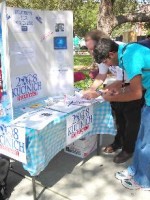Political underdogs reach Web-savvy students

With voter turnout expected to increase among college-age Americans in the 2008 primary and presidential elections, front-running and fringe candidates alike are chasing students with the media most familiar to them – blogs, Facebook groups, Myspace profiles, Wiki software and even text-messaging – in hopes of scoring votes.
The political climate at USF and other college campuses across the country, however, raises questions about the effectiveness of the bottom-up Internet activism that’s predominately fueled by youth.
Students are increasingly turning to the Web to network and start real-life political organizations, but it remains unclear how deep the so-called netroots will run come Election Day, when the most popular candidates on the Web are among the lowest ranked in official polls.
At USF, the only primary candidates with active student organizations supporting their candidacy are Ron Paul and Dennis Kucinich, even though Sept. 16 Gallup polls indicate 3 percent of Republicans would support Rep. Paul and 1 percent of Democrats would support Rep. Kucinich in the primaries.
Although a campus club exists for Sen. Barack Obama, who has 21 percent of polled Democrats’ support, information for the club has not been updated.
According to the Marshall Center’s listing of student organizations, clubs supporting other candidates have yet to be formed.
Paul’s and Kucinich’s popularity on campus, despite polling trends, is in keeping with the groups’ presence on USF’s Facebook network, where USF Students for Ron Paul has 20 members and Students for Kucinich 2008 has 10.
The ranks of Students for Kucinich, though fewer than USF Students for Hillary (Clinton) and three pro-Obama groups, reflect greater popularity than in the general electorate. The case is similar for Paul, who, despite gaining a mere 3 percent of Republicans’ support in general polls, has more members than Rudy Giuliani for President’s USF Chapter and USF for Fred Thompson, who is tied with Sen. John McCain at
18 percent.
The ranks of Myspace friend lists also confirm similar trends: front-running and minor candidates’ Internet presence and youth appeal don’t necessarily coincide with poll plausibility.
As of Tuesday, Paul’s had 64,308 friends, whereas Giuliani had only 5,176. Clinton and Obama had 137,364 and 177,611 friends, respectively, but Kucinich had 31,442, constituting a much larger percentage of Facebook users’ political friends than the 1 percent of voters he’s been getting in national polls.
Dr. Susan McManus, professor of political science at USF, chalks up college students’ support of Paul and Kucinich to historical trends in their voting patterns. College students, she said, gravitate toward non-mainstream candidates, especially because they tend to be anti-war, a stance popular on
campuses.
“That’s been true since the beginning of time,” she said of the popularity of minor or non-mainstream candidates on campuses. “College students are always mavericks and looking for unusual candidates.”
McManus added that the majority of college students wind up voting for the major Republican and Democrat candidates, but that the incidence of votes for minor or non-mainstream candidates is greater than for other age
demographics.
McManus said neither will get their party’s nomination, but Paul and Kucinich’s misleadingly strong Internet presence is fueled by the relationship between virtual activists and college students.
“(Paul)’s considerably more popular on the blogs than (in) reality,” said McManus, adding that the Internet lends itself to college students because it’s a form of moneyless campaigning.
Because “a certain kind of person” is really active on blogs and in netroots organizations, they don’t serve as an accurate demographic, McManus said.
That certain kind of person often turns out to be a college student.
“The real engine behind the netroots revolution is the activist college student,” said McManus.
Josef Palermo, 23, the youth coordinator for the Kucinich Campaign, said that candidate’s student-site uses open-source Wiki software. Text-message updates on Kucinich’s campaign are also available.
An official at Paul’s campaign said students were using social networking sites to learn more about the congressman and to better organize their efforts, but that the campaign wasn’t taking a top-down approach to campus activism. Rather, students were coming to it themselves.
This is exactly how Students for Ron Paul got started at USF, said Ryan Gauvey of the Paul
campaign.
“They’re not really helping us,” he said.
Gauvey, who is seeking a graduate certificate in geographic information systems and science at USF, said the Paul campaign offers to train supporters, but he hasn’t attended any seminars.
He said the campaign does send flyers, though, so that campus groups don’t have to spend money on copies.
Operating on its own, the recently formed group has been quite active on campus, even before the semester began. Before the start of school, Guavey and other Paul supporters campaigned at the library on the weekends by passing out flyers. So far, the group has tabled at Constitution Day and Bull Market Events.
Jessica Rohrbacher, a graduate student in social studies education and president of Students for Kucinich, said the primary concern of the club was to get the word out and get publicity.
She said she’s convinced that votes will come to Kucinich when people know of his platform, which includes the decriminalization of marijuana and the institution of single-payer health care.
“If we get the word out, he will get support,” she said.
Rohrbacher said she wasn’t worried Kucinich could alter primaries in a negative way by drawing votes away from front-running Democrats, a situation in which McManus said minor candidates could alter elections.
Instead, Rohrbacher said she was done with voting for the safe candidate.
“I can’t do it anymore,” she said. “I think a lot of people really feel this way. They’re sick of the status quo, and they’re not going to settle for the leading Democrat.”
Victoria Bekiempis can be reached at (813) 974-6299 or
oraclebekiempis@gmail.com.





